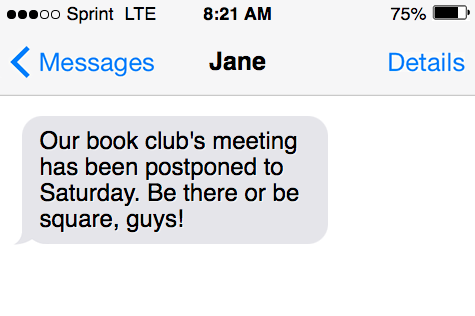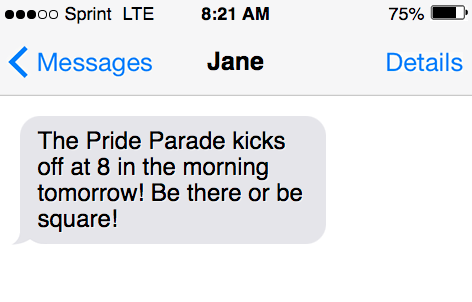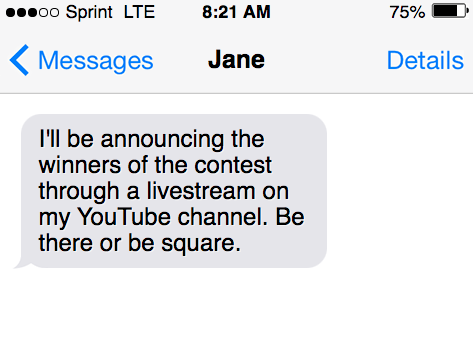Be there or be square! This idiom can get used all on its own to form an entire sentence. Or can get used in combination with other language to suggest an idea to another person. This is a unique expression commonly found in American English.
Learn all about this idiom in this short guide…
What does “be there or be square” mean?
The phrase “be there or be square” is a witty expression used to persuade someone to show up for an event or occasion. It denotes in a half-serious manner that those who do not come will be recognized as not-so-cool members of a clique.
The phrase suggests that the occasion will be lively and teeming with dynamic activities. It acts as a jovial reminder that the person who utters it really wants someone’s presence at the event.
To the person who needs to “be there”, it signifies that their group cherishes their connection to them and they are an irreplaceable member of the group.

Though the person will not be mistaken if they do not join everyone else, their contribution to the meeting is valued by the speaker.
The phrase maintains that the rendezvous will be an entertaining one and invites the person to literally be there with the others for their own enjoyment.
It also jokingly means that only those who are allergic to excitement and adventure would refuse to come.
It is commonly used to refer to a multitude of situations. The list includes social gatherings, friendly meetings, professional situations requiring teamwork, public events, celebrations, parties, and so on.
It is a humorous allusion to the status quo and an invitation to reinforce one’s affinity to their respective social circle.
| Form | Intention |
| Idiom | Suggestion to pursue an action |
Is it a positive or negative idiom?
Since “be there or be square” is a phrase uttered in good-humored situations, it does not carry any serious or negative connotations. It is a positive phrase usually employed to build synergy between a group of individuals by exhorting someone to take part in a social situation.
That does not mean it cannot be employed in serious situations, but only that the phrase does not carry any inherent negative connotations.

It is associated with positive attributes such as humor, motivation, belongingness, happiness and hope. “Be there or be square” in its most popular usage means that someone would certainly feel left out of the merriment and in order to prevent that, they need to join the party.
Else, they will have to face the fact that they are a dull person who avoids excitement and doesn’t like entertainment.
Origin of “be there or be square”
The etymological roots of “be there or be square” can be traced back to the mid-20th century and the Second World War. But the term achieved mainstream popularity in the beatnik era when the idiom slipped into the lingo used by hippies.
The slang originated from the meaning that a person who dislikes merrymaking is deemed to be “square” or a killjoy. It also means that they have old-school ideas, oppose new-age thinking, and do not know how to make the most out of life.

True to the prevalent notions of this era, the phrase signified that a “square” individual did not actively take part in being young, wild, and free. Some of the characteristics of the beatnik period included personal liberation, psychedelic experiments and evolving perceptions of conformation to society.
As a result, only a monotonous person would voluntarily reject these ideas and sit out of the enjoyment that everyone was embracing.
Others speculate that the phrase gets its meaning from a shape-related pun where someone who does not accept invitations is noted for their absence as they are deemed “square” instead of being “around”.
The phrase has also been a part of pop culture through the years and found its way into movies like The Goonies and Men in Black.
Synonyms for “be there or be square”
These are some phrases you can use that share the same meaning as “be there or be square“:
- attend
- make an appearance
- participate in
- join in
- take part in
- be present
- be a party to
- turn up
- partake in
- band together
- get here/there
- become a member of
- contribute to
- get involved in
- sign up
- team up
- come on the scene
- come along
- roll in
- roll up
- make it
Antonyms for “be there or be square”
There are some phrases that bear the opposite meaning of “be there or be square”:
- take one’s leave
- pack one’s bags
- get the hell out of dodge
- go away
- run away
- retire
- pull out of
- depart
- vamoose
- scram
- exit
- clear out
- check out
- abandon
- withdraw from
- back out of
- get out of
- give up
- bow out of
- pull out of
Examples of “be there or be square” in sentences
These are a few situations in which you can use the phrase “be there or be square” in sentences:
- Our book club’s meeting has been postponed to Saturday. Be there or be square, guys!
- The Pride Parade kicks off at 8 in the morning tomorrow! Be there or be square!
- I’ll be announcing the winners of the contest through a livestream on my YouTube channel. Be there or be square.
- Our party bus will be stopping only for 5 minutes on Sunset Boulevard. If you don’t want to miss it, be there or be square.
- The invitation for my best friend’s baby shower has finally come! Be there or be square, fam.
- All the biggest stars in town will be coming to the movie premiere. If you want to meet them, be there or be square.
- We spent our whole senior year planning for prom so you better be there or be square tomorrow.
Sources
- be there or be square
- What Does Be There or Be Square Mean?
- Be There or Be Square: What this Term Means, Where It Came From
- What Does Be There or Be Square Mean?
Inside this article
Fact checked:
Content is rigorously reviewed by a team of qualified and experienced fact checkers. Fact checkers review articles for factual accuracy, relevance, and timeliness. Learn more.
Core lessons
Glossary
- Abstract Noun
- Accusative Case
- Anecdote
- Antonym
- Active Sentence
- Adverb
- Adjective
- Allegory
- Alliteration
- Adjective Clause
- Adjective Phrase
- Ampersand
- Anastrophe
- Adverbial Clause
- Appositive Phrase
- Clause
- Compound Adjective
- Complex Sentence
- Compound Words
- Compound Predicate
- Common Noun
- Comparative Adjective
- Comparative and Superlative
- Compound Noun
- Compound Subject
- Compound Sentence
- Copular Verb
- Collective Noun
- Colloquialism
- Conciseness
- Consonance
- Conditional
- Concrete Noun
- Conjunction
- Conjugation
- Conditional Sentence
- Comma Splice
- Correlative Conjunction
- Coordinating Conjunction
- Coordinate Adjective
- Cumulative Adjective
- Dative Case
- Determiner
- Declarative Sentence
- Declarative Statement
- Direct Object Pronoun
- Direct Object
- Diction
- Diphthong
- Dangling Modifier
- Demonstrative Pronoun
- Demonstrative Adjective
- Direct Characterization
- Definite Article
- Doublespeak
- False Dilemma Fallacy
- Future Perfect Progressive
- Future Simple
- Future Perfect Continuous
- Future Perfect
- First Conditional
- Irregular Adjective
- Irregular Verb
- Imperative Sentence
- Indefinite Article
- Intransitive Verb
- Introductory Phrase
- Indefinite Pronoun
- Indirect Characterization
- Interrogative Sentence
- Intensive Pronoun
- Inanimate Object
- Indefinite Tense
- Infinitive Phrase
- Interjection
- Intensifier
- Infinitive
- Indicative Mood
- Participle
- Parallelism
- Prepositional Phrase
- Past Simple Tense
- Past Continuous Tense
- Past Perfect Tense
- Past Progressive Tense
- Present Simple Tense
- Present Perfect Tense
- Personal Pronoun
- Personification
- Persuasive Writing
- Parallel Structure
- Phrasal Verb
- Predicate Adjective
- Predicate Nominative
- Phonetic Language
- Plural Noun
- Punctuation
- Punctuation Marks
- Preposition
- Preposition of Place
- Parts of Speech
- Possessive Adjective
- Possessive Determiner
- Possessive Case
- Possessive Noun
- Proper Adjective
- Proper Noun
- Present Participle
- Prefix
- Predicate



